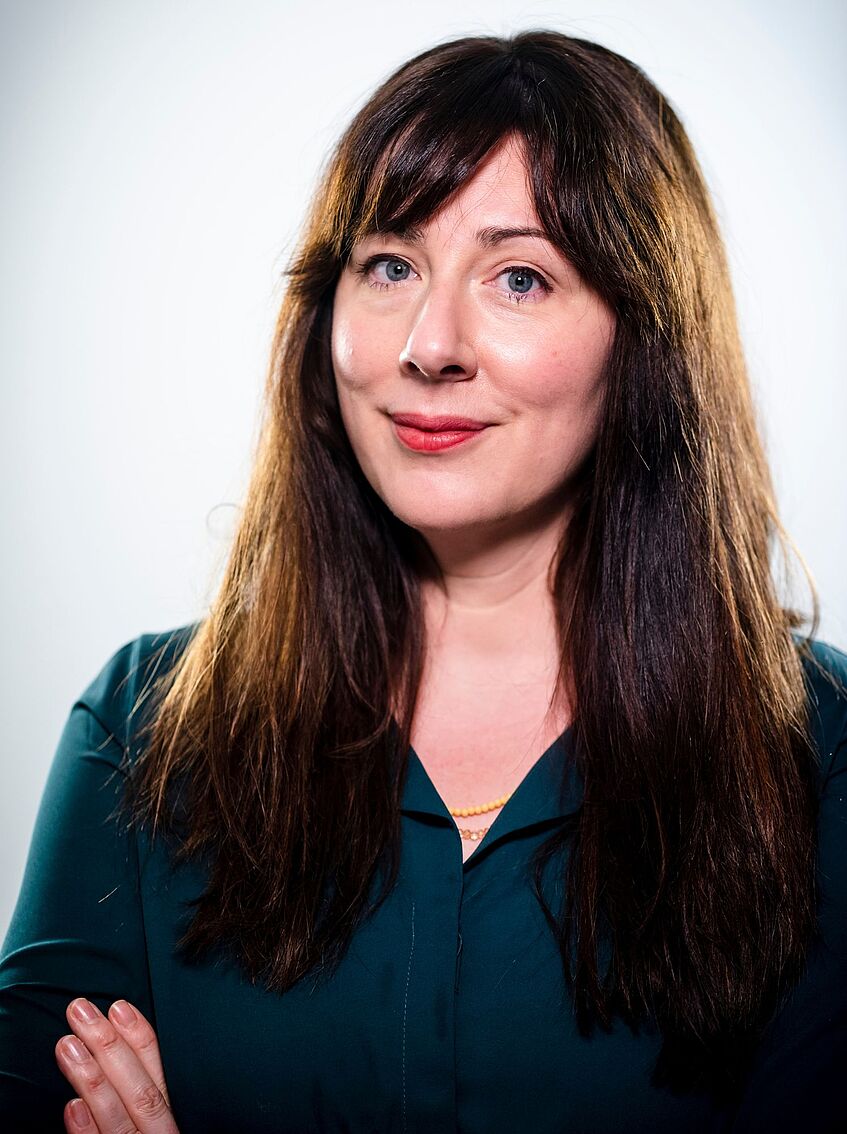Ass.-Prof. Dr. Nina Klimburg-Witjes

Tenure Track Professorship: Infrastructures, Innovation and Global Politics
Tel.:+43-1-4277-49610
eMail: nina.witjes@univie.ac.at
Consultation Hours:
to be arranged by email
Teaching: Link ufind
Biography
Nina's work centres on the complex and dynamic relationships between infrastructures, innovation, and shifting geopolitical landscapes. Her research employs qualitative, empirical methods to develop a grounded understanding of the interplay between global politics and technological transformations. Particularly, her work focuses on outer space governance, exploring topics such as cooperation, militarization, and environmental justice, as well as the nexus between security infrastructures, (digital) technologies and innovation discourses.
In 2022, Nina Klimburg-Witjes was awarded an ERC Starting Grant for her project "FUTURESPACE" The project uses the European Ariane 6 rocket as a case study to investigate the complex connections between large-scale infrastructures, European integration practices, and envisioned space futures in the new space race. Methodologically, Nina and her team will conduct an interdisciplinary ethnography, linking social science and aerospace engineering to explore the material, political, and imaginative dimensions of space infrastructures and their politics.
Nina is an active member of the international STS community. She regularly organizes panels at leading STS conferences and participates in various international academic networks and societies. She holds elected positions on the Council of the European Association for the Study of Science and Technology (EASST) and the Austrian Academy of Science (ÖAW) Young Academy, co-founded the international network for the Social Studies of Outer Space (SSOS) and is a member of the International Network on Security and Technology in Outer Space.
Nina Klimburg-Witjes received her PhD in Science and Technology Studies (STS) from the Technical University of Munich in 2017 (MCTS) and was co-leader of the research group "Science, Technology and Security" of the Engineering Responsibility Lab. She was a visiting researcher at the European Space Policy Institute (ESPI) in Vienna, a research fellow at the Austrian Research Foundation for International Development (OEFSE) as well as the Austrian Institute for International Policy (OIIP), and a research fellow at the Institute of Sociology at the Albert Ludwig University Freiburg.
Main Research Interests
- Imaginaries and Politics Outer Space
- Infrastructures of In/Security
- Technology, innovation and Securitization
- Social studies of outer space and future visions of Earth-Space relations,
- Science, technology and international relations
- Fieldwork in contexts of secrecy
Completed Research Projects
Recent Publications
Troubled Orbits and Earthly Concerns: Space Debris as a Boundary Infrastructure
- Author(s)
- Chlormann Michael, Nina Klimburg-Witjes
- Abstract
Like other forms of debris in terrestrial and marine environments, space debris prompts questions about how we can live with the material remains of technological endeavors past and yet to come. Although techno-societies fundamentally rely on space infrastructures, they so far have failed to address the infrastructural challenge of debris. Only very recently has the awareness of space debris as a severe risk to both space and Earth infrastructures increased within the space community. One reason for this is the renewed momentum of interplanetary space exploration, including the colonization of the Moon and Mars, which is part of transhumanist and commercially driven dreams of the so-called New Space age. Understanding space infrastructures as inherently linked to earthly infrastructure, we attend to the ways in which space debris, a once accepted by-product of scientific-technological progress, economic interests, and geopolitics, increasingly becomes a matter of concern. Drawing on qualitative interviews with European space sector representatives and work in Science and Technology Studies on infrastructures, we argue that their discursive efforts and visual representation strategies coproduce space debris as a boundary infrastructure. We suggest considering this boundary infrastructure as relating orbital environments and the planet through enacting sustainability and responsibility for beyond-planetary environments.
- Organisation(s)
- Department of Science and Technology Studies
- External organisation(s)
- Technische Universität München
- Journal
- Science, Technology & Human Values
- Volume
- 47
- Pages
- 960-985
- No. of pages
- 26
- ISSN
- 0162-2439
- DOI
- https://doi.org/10.1177/01622439211023554
- Publication date
- 2021
- Peer reviewed
- Yes
- Austrian Fields of Science 2012
- 103038 Space exploration, 509017 Social studies of science, 509025 Technology studies
- Keywords
- ASJC Scopus subject areas
- Anthropology, Economics and Econometrics, Philosophy, Human-Computer Interaction, Social Sciences (miscellaneous), Sociology and Political Science
- Sustainable Development Goals
- SDG 14 - Life Below Water
- Portal url
- https://ucrisportal.univie.ac.at/en/publications/7bb84a30-5427-4fdd-9080-f7d98add9a21
